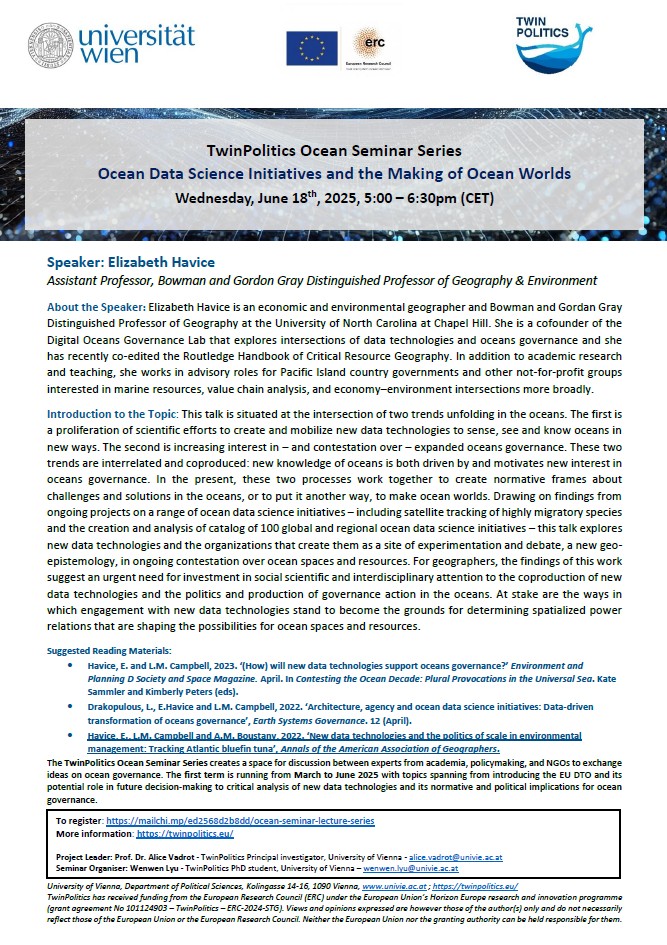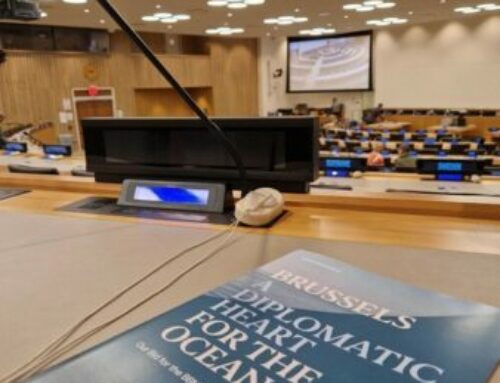With UNOC3 coming to an end, we invite you to our fourth and final Ocean Seminar this semester as a sort of cap to the big Ocean Conference!
In this fourth installment of our TwinPolitics Ocean Seminar Series on Wednesday, 18th June 2025, from 17:00 to 18:30 (CET) our guest speaker, Elizabeth Havice, will talk about the topic Ocean Data Science Initiatives and the Making of Ocean Worlds.
About the Speaker
Elizabeth Havice is an economic and environmental geographer and Bowman and Gordan Gray Distinguished Professor of Geography at the University of North Carolina at Chapel Hill. She is a cofounder of the Digital Oceans Governance Lab that explores intersections of data technologies and oceans governance and she has recently co-edited the Routledge Handbook of Critical Resource Geography. In addition to academic research and teaching, she works in advisory roles for Pacific Island country governments and other not-for-profit groups interested in marine resources, value chain analysis, and economy–environment intersections more broadly.
Introduction to the Topic
This talk is situated at the intersection of two trends unfolding in the oceans. The first is a proliferation of scientific efforts to create and mobilize new data technologies to sense, see and know oceans in new ways. The second is increasing interest in – and contestation over – expanded oceans governance. These two trends are interrelated and coproduced: new knowledge of oceans is both driven by and motivates new interest in oceans governance. In the present, these two processes work together to create normative frames about challenges and solutions in the oceans, or to put it another way, to make ocean worlds. Drawing on findings from ongoing projects on a range of ocean data science initiatives – including satellite tracking of highly migratory species and the creation and analysis of catalog of 100 global and regional ocean data science initiatives – this talk explores new data technologies and the organizations that create them as a site of experimentation and debate, a new geo-epistemology, in ongoing contestation over ocean spaces and resources. For geographers, the findings of this work suggest an urgent need for investment in social scientific and interdisciplinary attention to the coproduction of new data technologies and the politics and production of governance action in the oceans. At stake are the ways in which engagement with new data technologies stand to become the grounds for determining spatialized power relations that are shaping the possibilities for ocean spaces and resources.
Suggested Reading Materials
- Havice, E. and L.M. Campbell, 2023. ‘(How) will new data technologies support oceans governance?’ Environment and Planning D Society and Space Magazine. April. In Contesting the Ocean Decade: Plural Provocations in the Universal Sea. Kate Sammler and Kimberly Peters (eds).
- Drakopulous, L., E.Havice and L.M. Campbell, 2022. ‘Architecture, agency and ocean data science initiatives: Data-driven transformation of oceans governance’, Earth Systems Governance. 12 (April).
- Havice, E., L.M. Campbell and A.M. Boustany, 2022. ‘New data technologies and the politics of scale in environmental management: Tracking Atlantic bluefin tuna’, Annals of the American Association of Geographers.
Join Us!
📌 Register here: https://mailchi.mp/ed2568d2b8dd/ocean-seminar-lecture-series
📌 More information: https://twinpolitics.eu/
Join this meeting here: https://univienna.zoom.us/j/62004902769?pwd=mnLXdb9VZYp6ORnOmk8VXqcE0k8XjG.1
Password: 323467
Project Leader: Prof. Dr. Alice Vadrot – TwinPolitics Principal investigator, University of Vienna – alice.vadrot@univie.ac.at
Seminar Organiser – The TwinPolitics Team, University of Vienna – twinpolitics.erc.powi@univie.ac.at
This project has received funding from the European Research Council (ERC) under the European Union’s Horizon Europe research and innovation programme (grant agreement No 101124903 – TwinPolitics – ERC-2024-STG). Views and opinions expressed are however those of the author(s) only and do not necessarily reflect those of the European Union or the European Research Council. Neither the European Union nor the granting authority can be held responsible for them.




